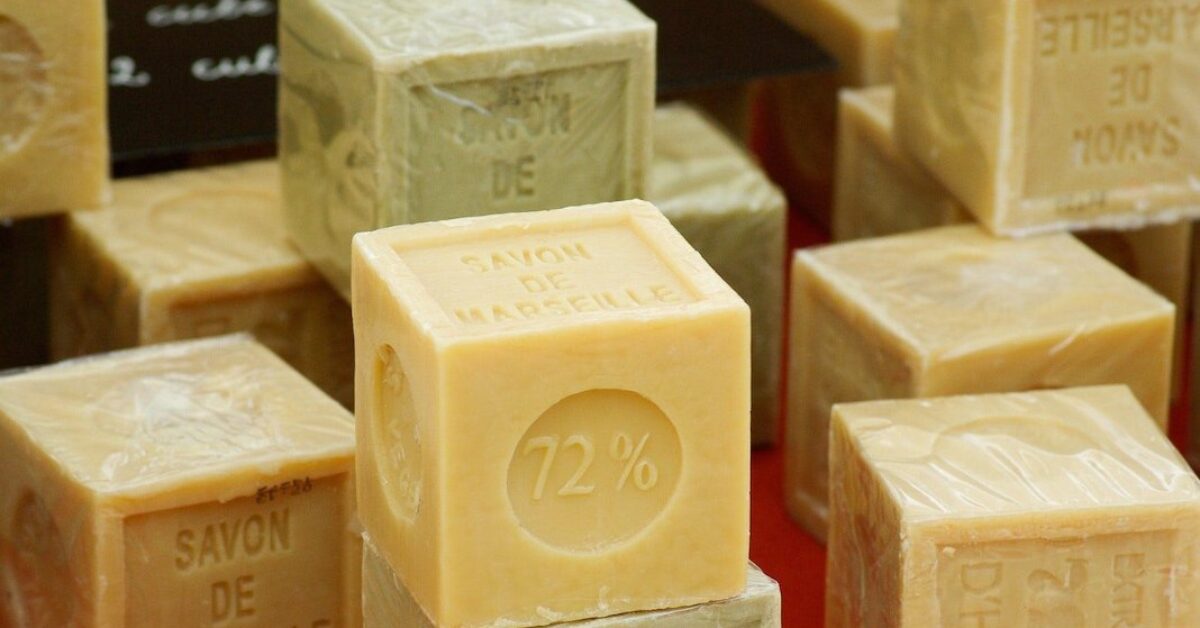Discover the Numerous Uses of Savon de Marseille
Savon de Marseille, or “soap from Marseille,” some devotees will argue, is almost the best thing to have ever come from Marseille (if you don’t count bouillabaisse, aïoli sauce, Ricard pastis, and the Olympique de Marseille soccer team.) This all-natural (and sustainable) olive oil-based soap which has been made in Marseille for almost 650 years is suitable for an array of daily uses, thus making it an environmentally good choice, and, it turns out, a good choice for your body, too.
Frenchly wanted to find out more about all of the uses for this iconic French soap (which now comes in the form of soap chips, as well) and so we did a little digging. We think you will come to agree with us that Savon de Marseille should be your go-to gift for everyone from your grandmother to your boyfriend for any occasion!
Savon de Marseille is documented as first being made in 1370. But, it wasn’t until 1688 that Louis XIV standardized the soap as we know it today and regulated its production. Savon de Marseille came to be (and remains) a soap with no artificial additives, no colorants, no perfumes or fragrances, no animal fats, and, to make it the real deal, it must contain at least 72% olive oil, which accounts for its natural green color. Today there is also a white variant and other options with different oil bases. But the olive green block of soap with the stamped 72% on its side has been one that encourages accolades and acolytes. “It took me almost two decades to move to the ’72 percent side,’ but now that I’m there, I’m not going back,” approves Chef David Lebovitz on his blog.
The Union des Professionels du Savon de Marseille was founded in 2015 to protect the traditional Marseille-style soap. “The authentic Savon de Marseille made by the UPSM soap factories is a hard and homogeneous soap, of different size and shape: cube, parallelepiped, bar, slices, oval, or shavings and flakes,” says the organization’s website.
According to their rules, every true Marseille soap must hold three simple criteria:
- It must hold a maximum of four ingredients including water, sea salt, sodium hydroxide, and 72% of vegetable oil.
- The brand must follow a strict 5-step manufacturing process.
- It must originate from the Marseille region (the 13th,) the Bouches-du-Rhône department.
Thus only a few candidates make the cut: Fer à Cheval, Savonnerie de la Licorne, Savonnerie du Midi, Savonnerie du Sérail, Grand Savonnerie de Marseille, and Rampal-Latour. You can’t fool a Marseillais with sub-par soap. No Johnson & Johnson wannabe such as Le Petit Marseillais can make it through.
Hygiene
Being that Savon de Marseille is a soap, it does its job of cleaning bodies quite well. It can be used as a body wash, shampoo, facial cleanser, make up remover, shaving soap, and even as a natural toothpaste. As the soap contains no coloring, no fragrance, no parabens and no palm oil, it is quite gentle to the skin and much more economical when compared to other cleansers that strip moisture from the skin and then require a second product to put it back. Many enjoy adding some soap into their bathwater as well for a gentle, calming, bubbly effect.
It is also quite effective as a wash for oily hair, claims the Marius Fabre brand which outlines more than 24 extra uses for the soap on their site. As for using it as a toothpaste, it actually tastes better than most toothpaste, but offers a gentler sensation while still leaving your teeth perfectly clean and white.
Another bonus is that it is hypoallergenic and dermatologist-recommended.
* Savon de Marseille can also be used for the hygiene of your furry friends says Life Before Plastik: “To wash your dog or cat, gently rub the wet soap bar directly onto the fur and thoroughly rinse to ensure no residue is left.”
Housekeeping
Savon de Marseille is an active helper in cleaning in general, easily replacing dish-washing liquid as well as being useful to help clean floors and hard home surfaces, rugs, sofas (including leather ones), toilets, and it can be used in reviving vintage leather handbags and cleaning jewelry, too. There isn’t much need for chemical-based detergent, it turns out, when olive oil soap, as the French have known for centuries, can get the job done perfectly. “Natural and economical, Marseille soap for the laundry leaves a pleasant scent in the home and makes your floors shine,” states Marius-Fabre.
View this post on InstagramA post shared by UPSM, Savon de Marseille (@authentiquesavonmarseilleupsm)
Just mix soap with warm water, and proceed to clean as per usual with the soapy mixture. In order to revive the shine on your leather goods, add a few drops of ammonia into the mix for extra shine. For jewelry and other trinkets, keep your pieces soaking in the soapy water for about 10 minutes.
Fabric Cleanser
Savon de Marseille is great at removing fabric stains, but also works as a laundry detergent. Marius Fabre advises the following mixture for Savon de Marseille:
View this post on InstagramA post shared by UPSM, Savon de Marseille (@authentiquesavonmarseilleupsm)
Ingredients for 1 liter of home-made laundry wash: 25g Marseille soap flakes, 1L water, 1 tablespoon bicarbonate of soda (optional), 10 drops of lavender or eucalyptus essential oil (optional).
Self-Care
Be it an old wives tale or not, but Savon de Marseille is also rumored to aid in relieving cramps. Keep a piece of soap under the bottom sheet of your bed and cramps are said to dissipate just like that. Whether or not that works, it does help sooth light burns when applied with a little cool water. This gentle soap is famous for its disinfecting properties, so it should be your go-to for cleaning wounds. Finally, it also helps to soothe itching from eczema, psoriasis or insect bites. Rub a bit of soap on the spot for relief.
Miscellaneous Uses
Some put the soap in their closets to keep their clothes smelling fresh. When they do that, they might not know it, but the soap will keep away insects, too. Soap is quite a powerful insecticide–indeed surfactants are used in chemical insecticides– and can even work to keep pests away from your plants. Just dissolve a little Savon de Marseille in water and spray your plants if you notice a few aphids and you don’t have any lady bugs eating them up.
This versatile soap is quite the extra helper in all things for the home and self-care, proving it to be a worthy investment. While in France it is easily available at every corner store for a price of about 4 euros, it is also available in some specialty stores stateside, on Trouva ($9.99) and there are several options on Amazon.
—
Angelika Pokovba is a lifestyle writer with a francophile soul and is based in the depths of the Mayan jungle in Mexico. After studying journalism in Paris, she worked at L’Officiel and Essentiel Homme magazines, and contributed to several fashion publications in between.






